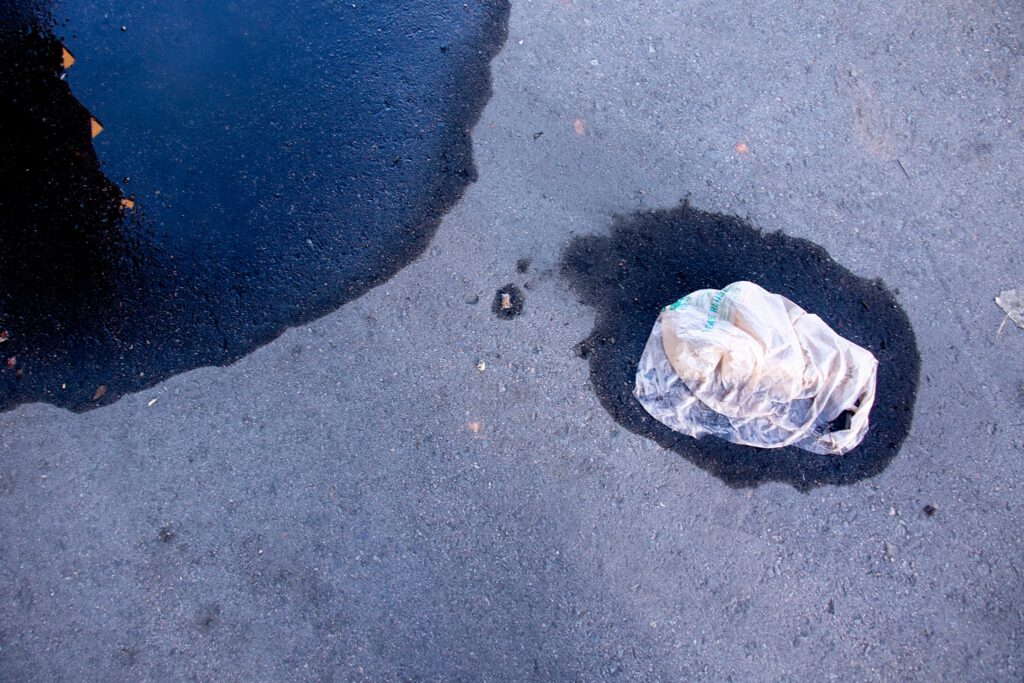Maybe you’ve been there — you’re at the grocery store checkout and you get the question. It used to be, “Paper or plastic?” but now in Colorado, it’s “How many bags do you want to purchase?”
Coloradans have faced this question for almost a year since the state banned single-use plastic bags. And if you either overshopped for the reusable bags you brought or forgot them in the car, you’ll have to pay for bags. Ten cents a pop.
That fee started in January — and one CPR listener asked Colorado Wonders about that. Does the bag fee make money? And where does it go?
Local and statewide ban
The statewide ban on disposable plastic bags took effect in 2024 as part of the Plastic Pollution Reduction Act. The law was passed in 2021. It required large businesses to stop providing single-use plastic carryout bags by Jan. 1.
It’s not the Colorado Department of Revenue that collects or enforces the fee. That responsibility is on the municipalities and county government.
“We take a reactive approach. So, we rely on the retailers to collect these fees from their customers, and that’s not to say that it’s well within the city’s purview to audit collections of the bag fees,” said Danny Nunn, interim finance director for the City of Pueblo. “But right now, it’s sort of on the honor system of the retailer..”
Sixty percent of the fee revenue goes to the municipalities and counties where the stores are located. The businesses can keep the remaining 40 percent.
Denver had a pretty smooth transition when the ban went statewide — the city had a head start. The Denver City Council passed the law to implement the 10-cent fee on single-use plastic bags in late 2019. It took effect on July 1, 2021.
The state bag fee rules exempt small businesses with three stores or fewer from charging the fee. But, Denver had already taken it a step further.
“Denver’s ordinance has always included small stores. And since the state law requires that municipalities implement the policy in a way that’s as strict or more strict than state law, we are able to apply the ban on plastic bags to all stores in Denver, regardless of size or number of locations,” said Natalie Lana, administrator for the Disposable Bag Fee Program in Denver’s Office of Climate Action, Sustainability, and Resiliency.
How much do local governments collect? How do they use it?
From its share of the bag fee, Denver has made $697,669 in 2024 and $6.2 million in revenues since the implementation of the fees. Aurora has collected $1,661,000 in fees.
Other places like Pueblo aren’t seeing millions of dollars. They only made $300,000 from the fees. Local governments generally recycle their cut back into the bag fee program.
“The disposable bag fee revenue has been used to fund really [Denver’s] innovative programs to reduce waste, such as helping restaurants transition to reusable food wear for dine-in services and supporting events in waste reductions through reusable and returnable containers,” Lana said.
Kevin J. Beaty/Denverite
This includes the Reuse Denver program that helps small restaurants save money by replacing disposable service ware with reusable food service ware like plates, bowls, cups, or cutlery.
Aurora uses the funds for its shopping cart clean-up initiative and future initiatives such as city beautification efforts.
How do businesses use the money?
Businesses also use their cut of the fee to promote the program through education and signage.
Chris Howes is the president of the Colorado Retail Council. Since 1998, he has lobbied for the Retail Council, which represents Colorado’s largest grocery and retail stores and with bill sponsors for the fee. Howse said the transition was relatively easy.
“We went to great lengths to put up signs and prepare the customers before the law was implemented, but here we are as one of those states that prohibits plastic single-use bags at checkout in the entire state,” Howes said. “We kind of prepped the customers through signage at the point of sale, and of course, we were allowed to work through the existing inventory of plastic bags that the stores had. Of course not just thousands, tens of thousands, hundreds of thousands of reusable plastic bags. So that time is over, the transition time is over, and this is the law now.”

Kevin J. Beaty/Denverite
Even though enforcement isn’t specifically laid out in the bill, Howse said all members of the Retail Council are in compliance.
“I think in general, it is being followed. I haven’t heard of any folks saying there’s a rampant misuse or not following state law. So I haven’t heard any feedback from customers or members saying that this has not gone rather smoothly,” Howes said. “Certainly there are customers who disagree with it, but that has nothing to do with the retailers following the law that was implemented.”
Some might view paying a 10-cent bag fee for something as small as a paper bag as just another way the government can make some money. That doesn’t apply to this particular fee.
In fact, it does the opposite. Lana said the goal is not to collect more revenue but to reduce the amount of disposable bag usage. She said there’s been a decline in revenue because more people are using less disposable bags.
“That’s a really great thing and an indicator of success for us. We have about, I think, an average of 5 million fewer disposable bags every year in Denver because of this program,” Lana said.
It’s safe to say it’s one fee that cities are happy to lose money on as long as it helps the environment.

